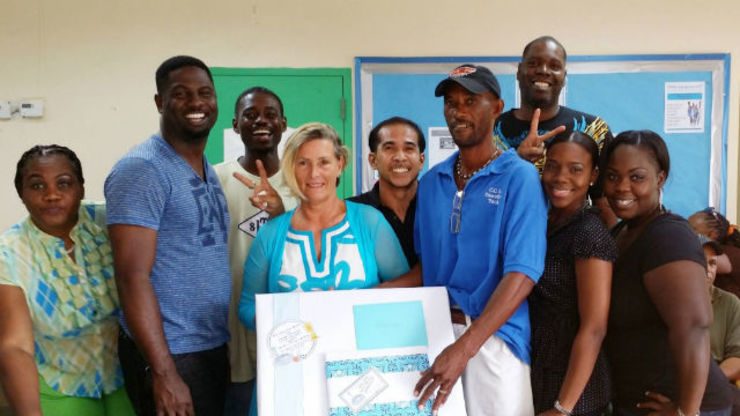SUMMARY
This is AI generated summarization, which may have errors. For context, always refer to the full article.

As early as in the 60s, the Bahamas, a small British Commonwealth, has been home to many Filipinos. At present, there are more than 1,000 Filipino workers who are mostly housekeepers, cooks, medical workers and hotel employees. Filipino teachers also find their way in this territory of 700 islands.
Among them is Ariel Alacaba, who arrived in Nassau, New Providence, on December 31, 2003. He was recommended by a Filipino friend to an employer in the Islands. He was interviewed on the phone and afterwards processed all the documents to work there.
“I was a teacher in a government school in the Philippines. But I chose to go abroad because the salary was not enough to provide for my family, as I am the only one working. My wife takes care of our two children,” he says.
“I was supposed to work as a gardener as specified in the contract, but it turned out I became an all-around domestic to a Greek family here,” he recalls. Although the salary was good, he knew that he was exploited. He signed for a one-year contract.
“I never thought that I could find a job that would fit my qualifications,” he says.
After a few months, he befriended a Bahamian nurse who told him that the government was in need of a Mathematics teacher. This gave him an idea to try his luck in the government service.
A Science and Math teacher in the Philippines for 12 years before this, Ariel applied, knowing that he was qualified. When he passed the job interview, however, he was still under contract with the Greek family. To terminate the contract, he sought the help of the Secretary of Education and a lawyer, saying he was maltreated and threatened by his employer. After 7 months he was declared free from his previous contract and was able to work at Claudius Roland Walker Senior High School in August of 2004 until October 2011. Because of his good performance, the superintendent transferred him to C. Sweeting Senior High School on October 2011 until the present. He renews his contract every 3 years.
Ariel is teaching Grades 10,11 and 12.
“There are a lot of Filipinos here. But as of now I am the only Filipino in my school. There was a Filipino who used to work here, but already retired. Most are teaching in private schools,” says Ariel.
It is not difficult to teach in the Bahamas because they speak English. But Ariel emphasizes that rapport must first be established with the students so teachers could earn their respect.
He also experienced some forms of discrimination, but not as bad. Name calling is very common. “I am called Pacquiao, Jackie Chan or Jet Li,” he says.
Coping with homesickness
It might be the loneliest New Year he ever experienced because he left on New Year’s Eve, yet Ariel set his mind that loneliness should not be a hindrance to his dreams for his family. Constant communication through Skype and Facebook makes him updated with his children’s activities.
Since Bahamas is a tropical country, he does not have difficulty adjusting to the food. He cooks Filipino food because the ingredients are available, although the cost of living is quite high compared to the Philippines. When it comes to people, the Bahamians are friendly and there is no language barrier that hinders effective communication. He also helps in organizing and facilitating of sports activities within the Filipino community.
“As much as possible, I put it in my mind that I would never be homesick. If I become homesick, I would go home and all my dreams for my family would never happen,” he explains.
Bahamianization threat to OFWs
In 2013, the Philippine Embassy in the United States expressed their worry over the proposed “Bahamianization” of the local workforce which could displace the Filipino workers. The Bahamas officials appreciated the contribution of the Filipino community in their country but they also have to give work to their own citizens, which is understandable according to the Philippine officials. Yet, the Philippine Embassy is hopeful that the Filipinos will keep their jobs.
Still, Ariel and his fellow Filipinos seem unaffected by the news and continue working knowing that they are doing their jobs well. To date, the Bahamas government is still hiring Filipinos who are qualified to fill in jobs, according to Ariel.
As of now, he has no desire to find work elsewhere or settle for good in the Philippines.
“When my youngest daughter finishes her college education, maybe I will be home for good,” he says. His daughter is an incoming freshman next school year.
To fellow OFWs, Ariel says that they must hang on, be patient, be tolerant of other people and continue their enthusiasm for work. After all, he says, their goal is to have better lives for their families. – Rappler.com
Eunice Barbara Novio is an English as a Foreign Language (EFL) lecturer at Vongchavalitkul University in Nakhon Ratchasima Thailand and a freelance writer.
Add a comment
How does this make you feel?
There are no comments yet. Add your comment to start the conversation.